King Khalid International Airport
King Khalid International Airport (Arabic: مطار الملك خالد الدولي Maṭār al-Malik Khālid al-Duwaliyy, IATA: RUH, ICAO: OERK) is an international airport located about 35 kilometres (22 mi) north of Riyadh, Saudi Arabia,[3] designed by the architectural firm HOK, and Arabian Bechtel Company Limited served as the construction manager on behalf of the Saudi government.
King Khalid International Airport مطار الملك خالد الدولي Matār al-Malik Khālid al-Duwaliyy | |||||||||||||||
|---|---|---|---|---|---|---|---|---|---|---|---|---|---|---|---|
 | |||||||||||||||
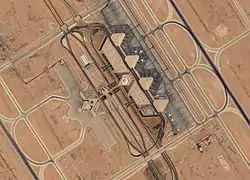 | |||||||||||||||
| Summary | |||||||||||||||
| Airport type | Public | ||||||||||||||
| Owner/Operator | Riyadh Airports Company | ||||||||||||||
| Serves | Riyadh | ||||||||||||||
| Location | Riyadh, Saudi Arabia | ||||||||||||||
| Opened | 16 November 1983 | ||||||||||||||
| Hub for |
| ||||||||||||||
| Elevation AMSL | 2,049 ft / 625 m | ||||||||||||||
| Coordinates | 24°57′28″N 046°41′56″E | ||||||||||||||
| Website | kkia | ||||||||||||||
| Map | |||||||||||||||
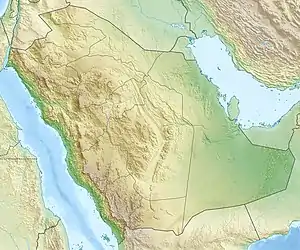 RUH Location of airport in Saudi Arabia  RUH RUH (Middle East) 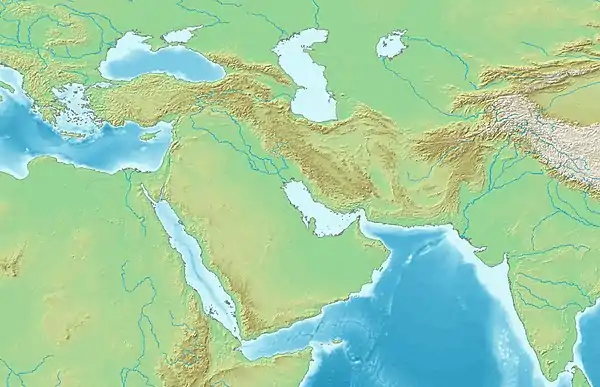 RUH RUH (West and Central Asia)  RUH RUH (Asia)  RUH RUH (Eurasia) 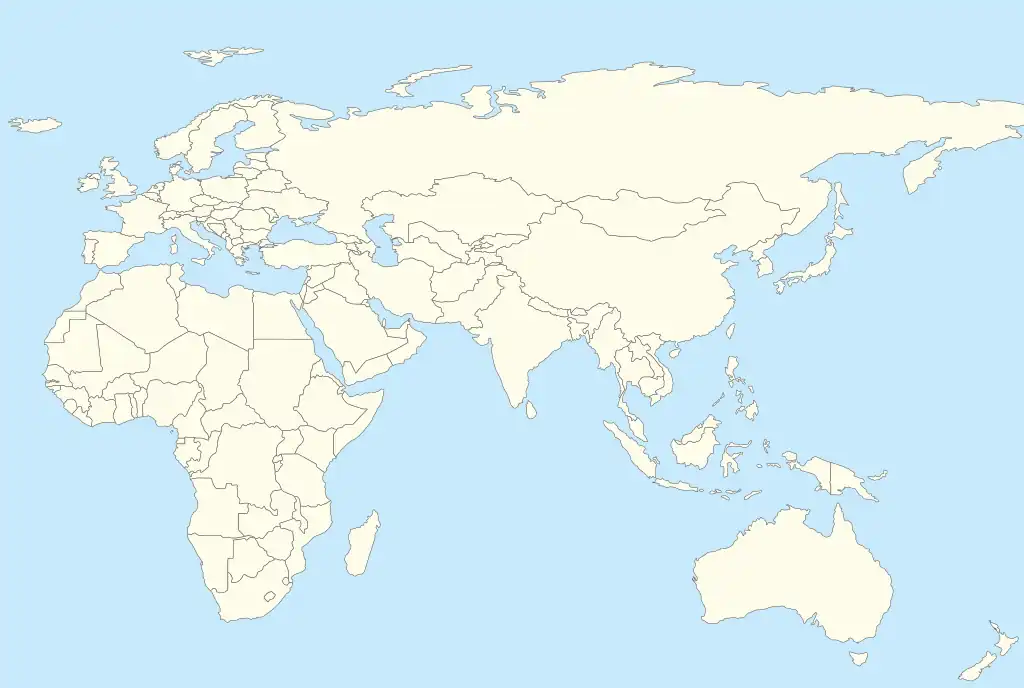 RUH RUH (Afro-Eurasia) | |||||||||||||||
| Runways | |||||||||||||||
| |||||||||||||||
| Statistics (2018) | |||||||||||||||
| |||||||||||||||
This airport consists of five passenger terminals (only three of which are in use), with eight aero-bridges each, a mosque, covered and uncovered car parking for 11,600 vehicles, an additional Royal Terminal (for the kingdom's guests, government heads, and Saudi royal family use), a central control tower (one of the world's tallest), and two parallel runways, each 4,260 metres (13,980 ft) long. Formerly the largest airport in the world in terms of ground area, the land area allocated for KKIA is the second-largest in the world, after King Fahd International Airport.[4] The airport is managed and operated by Riyadh Airports Company. The Royal Mosque was designed with a significant programme of integral art; the stained glass, by British architectural artist Brian Clarke, was a landmark work in the history of the medium, considered to be the largest and technically most advanced stained glass project of the modern period.[5]
History
King Khalid International Airport (KKIA), designed by architectural practice Hellmuth, Obata & Kassabaum,[6] was opened by HRH King Fahd on 16 November 1983, and opened for scheduled flights on 5 December of the same year. Until then, what is now Riyadh Air Base served commercial flights to and from Riyadh. Increased international and local air transport requirements for Riyadh made the change necessary. Riyadh Air Base, which is much closer to the city center, is operated by the Royal Saudi Air Force.
This airport was an alternative landing site for NASA's Space Shuttle.[7]
Structure and facilities
Passenger terminals
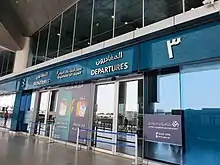
There are five main passenger terminals at the airport, four of them were built when the airport started operation in 1983, and Terminal 5 was opened in 2016.
- Terminal 1 was used for all international flights (except those operated by Saudia and Middle East Airlines, which are Skyteam members and Flynas), Though is temporarily closed for renovations and might be used by Riyadh Air.
- Terminal 2 was used for all international flights by SkyTeam members, including Saudia, and Flynas, though now it’s used for all international flights (except those operated by Saudia and Middle East Airlines, which are Skyteam members and Flynas).
- Terminal 3 has been reopened following its re-development, it hosted shuttle flight to Doha during the World Cup,[8] though now hosts Flynas, Flyadeal, and all skyteam members (except Saudia).
- Terminal 4 has been redeveloped and is now operational. It currently hosts Saudia's international flights.
- Terminal 5 is the newest terminal opened in 2016, which is now used by Saudia and Flynas for domestic flights.
Terminal 1 to 4 were built when the airport was opened in November, 1983. They are connected to each other by means of three linking buildings, each 168 metres (551 ft 2 in) long. Each terminal is triangular in plan, with a base of 47,500 square metres (511,000 sq ft) area. The complex includes a modern VIPs terminal plus restaurants, cafeterias, airlines offices, government departments, hotels and rent-a-car companies counters, banks, first aid clinics and commercial shops.
Terminal 5 is a 106,500 square metres (1,146,000 sq ft) rectangular building which can serve 16 narrow-body or 8 wide-body aircraft. Operated by Irish airport operator Dublin Airport Authority, it is Saudi's first privately run airport terminal and can handle 12 million passengers per year.[9]
The Royal Terminal
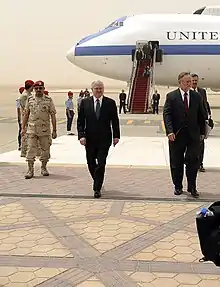
Heads of state and other high-ranking VIP visitors to the kingdom are greeted in the Royal Pavilion. The Royal Pavilion has open spaces, garden areas, and fountains. A ceremonial hall 12.5 metres (41 ft 0 in) wide and 390 metres (1,279 ft 6 in) long connects it to the mosque. The design and geometry of the building are similar to those of the other terminals architecturally and in the aesthetic respect. Arriving guests can use either air bridges or escalators to enter the building from the aircraft parking area. The ceremonial area on the airside has space for special receptions involving honor guards and bands. Like the passenger terminals, the Royal Pavilion has a triangular plan, with a roof composed of 33 arched sections rising to a high point 30 metres (98 ft 5 in) above the ground level. Glass walls and windows illuminate the interior of the building.
General aviation terminal
A general aviation complex has been constructed north of runway number 1 for use by private aircraft and is reached by a special access road which runs north from the airport access highway. The general aviation facility includes a passenger terminal, aircraft parking and maintenance facilities, taxiways and parking for visitors, tenants and staff. In addition to privately owned aircraft, this facility accommodates Saudia's special flight services group. It's also home to Alsalam Aircraft Company, Ltd. Programmed Depot Maintenance (PDM) on Royal Saudi Air Force aircraft is performed at the uniquely designed facility.
Expansion
In July 2014, German construction company Hochtief won the bid for the airport expansion which aims at increasing its capacity from 15 million to 25 million and includes construction of a new fifth terminal.[10] The contract was valued at €1.3 billion and will be carried out by Hochtief with a 55% stake, along with Indian engineering company Shapoorji Pallonji Mideast and Saudi Arabian construction company Nahdat Al Emaar. Construction is expected to be completed by May 2019.[11] Terminal 4 is expected to be equipped with required facilities. KKIA has not witnessed any development since its establishment in 1983.
The airport will be linked with the city's new metro system, and the GACA has reached an agreement with Riyadh Development Authority for the purpose. The metro system will help passengers reach the city center quickly and comfortably, adding that spots have been allocated in the project for the metro lines. Saudi Railway Company will construct the main railway station on the southeastern part of the airport to be linked with the terminal through the metro system.
King Salman International Airport
King Salman International Airport is a proposed new airport to be built over King Khalid International Airport. The new airport will have no fewer than six parallel runways and capacity for up to 200 million passengers annually.[12]
The Royal Mosque
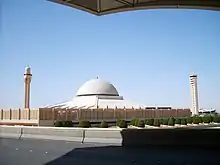
The Royal Mosque is set within a plaza in a central position in the airport. KKIA was the first airport in Saudi Arabia to be built to then-contemporary engineering standards and the mosque was at the time of its construction the most modern mosque in the world, notable for its use of advances in construction and engineering to create a modern complex in a vernacular Arabic style, and for its programme of integral art, at that time the largest in the world,[13] marrying traditional Islamic decorative elements[14] with, and interpreted through, the work of contemporary artists.[15][16] Hexagonal in plan, and enclosing an area of over 60,000 sq ft (5,600 m2), its scale, location and design make it the most dominant building in the passenger complex.[17] The mosque can accommodate 5,000 worshippers inside,[18] with capacity for an additional 4,000 in the surrounding plaza.[3] The mosque's dome, 33 metres (108 ft 3 in) in diameter and internally clad in polished bronze,[19] is internally separated from the lower roof of the building by a seven-foot clerestory ring of stained glass windows, below which runs a calligraphic mosaic band designed by Iranian-Armenian painter Edman Ayvazyan. The hand-cut glass and marble mosaic, measuring 250 square metres (2,700 sq ft) and fabricated with Clarke's assistance, was the largest in the world at the time,.[20] The dome's apex, at 40 metres (131 ft 3 in) above the arrivals level roadway, is higher than all the other structures in the passenger complex with the exception of the control tower and minaret. At the time of its construction, the programme of decorative and integral art[21] for the mosque constituted one of the largest single art projects of the period. In the northeast corner of the mosque plaza, a minaret rises 39 metres (127 ft 11 in) above the plaza level. A spiral stairway inside the minaret provides access to loudspeakers that broadcast the prayer calls five times daily. There are 5,030 square metres (54,100 sq ft) of floor space on the main floor of the mosque and another 765 square metres (8,230 sq ft) on the mezzanine floor. A Koranic library off of the main mosque floor has 50 square metres (540 sq ft) of user space and the same amount for storage space. The library, private offices and lavatories are located along the southeast on the southwest walls.
Stained glass
In 1982, through the Vesti Corporation, the British architectural artist Brian Clarke was commissioned to conceive of a scheme of stained glass artworks for the interior of the Royal Mosque. Clarke made a study of Islamic ornament at the Quran schools in Fez and Tangiers for six weeks, and produced a series of abstract designs that engaged with historical pan-Islamic decorative tradition. Completed in 1982 and containing 2,000 square metres (22,000 sq ft) of stained glass, the Royal Mosque was considered to be the largest and technically most advanced stained glass project of the modern period, requiring the full staff of 4 stained glass factories and 150 craftsmen, taking a year to fabricate.[22] The technical demands of the designs required the revival of certain traditional manufacturing techniques, the development of new ones to accommodate the programme of ornate geometric leading, and the deployment of modern technologies and materials, including screenprinting[23] and the acid-etching of float glass.
Runways and aprons
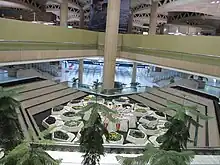
| Aspect | Details | ||
|---|---|---|---|
| Runways | 2 | ||
| Runway length | 4,205 m (13,796 ft) | ||
| Runway width | 60 m (200 ft) | ||
| Runway shoulders | 7.5 m (25 ft) x 2 | ||
| Runway paved blast pads | 120 m (390 ft) x 2 | ||
| Taxiway width | 23 m (75 ft) | ||
| Taxiway shoulders | 13 m (43 ft) x 2 | The highest point of the landing | 226 m (741 ft) |
| Cross taxiway width | 28 m (92 ft) | ||
| Cross taxiway shoulders | 14.5 m (48 ft) x 2 | ||
| Large-sized aircraft stands | 20 + 12 royal terminal | ||
| Small-sized aircraft stands | 22 | ||
| Cargo aircraft stands | 4 (Large) | ||
| General aviation stands | 36 | ||
| Helipads | 1 Royal terminal |
Air traffic control tower
Centrally located in the passenger terminal complex, between the Royal Pavilion and the mosque is the air traffic control tower standing at 81 metres (265 ft 9 in) high. Twr Freq. 118.6E & 118.8W. GND 121.6. CD 121.8. Riyadh Dept. 120.0 Riyadh Approach 126.0
There are 19 separate floor levels in the tower, including the operations area at the base of the tower and a total of 1,230 square metres (13,200 sq ft) of floor space. Six of the 19 floors are considered main floors. These include the operational level at the base of the tower, two equipment floors, an observation floor, a service floor and the cab floor at the top of the tower from which the air traffic controllers overlook the entire airport. The operations floor houses the radar control center for the airport as well as conference rooms, offices and a training area. The two equipment level contain mechanical and electrical equipment and cables, and the service floor contains a kitchen, lounge and lavatories for personnel on duty in the cab. The cab itself contains controller operating positions and electronic and communications equipment. The tower is supplied with two sources of standby power should the regular source of power be interrupted. Once source is the standby power supply at the central power plant – three diesel engine generators. In addition, a 300-kilowatt diesel engine located in the tower itself can provide a secondary source of emergency power. The tower is outfitted with the most advanced electronic radar systems and data processing equipment available.
Inter-terminal connectivity
Passengers going from one terminal to another at King Khalid International Airport can utilize moving sidewalks for transportation. The moving walkways, the first to be installed at any Saudi airport, are located in the three link buildings that connect the international and domestic terminals.
There is a total of 1,196 metres (3,924 ft) of the walkways, which are actually wide conveyor belts which operate at floor level and move at a speed of close to 1 metre per second (2.2 mph). Additional passenger conveniences in the terminal complex include 80 elevators and escalators. In the parking garages, 16 escalators are provided, and two serve the mosque.
The elevators, escalators and moving walkways all have the latest safety equipment installed. Should a fire occur, the elevators would automatically be recalled to the main floors and the doors opened. The escalators and moving sidewalks are equipped with fire and smoke detectors which will cause them to stop automatically should a fire be detected.
Airbridges
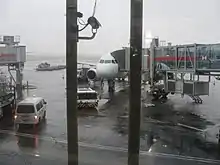
KKIA was the first airport in the Kingdom to install airbridges, to speed up handling and turnaround times. Each terminal has eight gates with airbridges effectively eliminating the need for bus journeys between the terminal buildings and waiting aircraft.
Landscaping
KKIA has more than 500,000 square metres (5,400,000 sq ft) of landscaping. Over 225,000 trees, vines, shrubs and ground cover plants were used to landscape the airport site and the interior courtyards. A factor in the landscape design was the limited availability of irrigation water. All of the plants selected for the site are tolerant of heat, wind and dry soil conditions. Wherever possible, plants with a history of successful growth in the Riyadh area or similar environments were selected.
Safety
This facility has five separate fire houses, with several modern firefighting vehicles, and trained firefighters. The location also has security equipment and a security force.
Parking facilities
Two large three-level garages have been constructed directly in front of the passenger terminals, one on either side of the airport mosque. They are connected to the terminals and to the mosque by pedestrian walkways under the arrivals level roadway. The design capacity of the garages is 11,600 vehicles. The garages are built of cast-in-place concrete, and each covered level is 4 metres (13 ft 1 in) high. Escalators and elevators are available in these garages, as well as stairways between the different levels.
Airlines and destinations
Passenger
Cargo
Traffic statistics
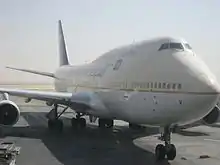
_(8886427334).jpg.webp)
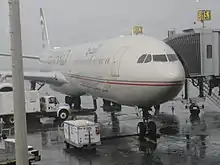
| Year | Total passengers | Total Aircraft movements |
|---|---|---|
| 1998 | 8,055,000 | 70,909 |
| 1999 | 8,234,000 | 73,336 |
| 2000 | 8,411,000 | 74,945 |
| 2001 | 8,737,000 | 75,535 |
| 2002 | 9,045,000 | 75,623 |
| 2003 | 9,168,000 | 74,600 |
| 2004 | 9,911,000 | 77,327 |
| 2005 | 10,573,000 | 84,555 |
| 2006 | 11,017,000 | 94,250 |
| 2007 | 11,783,000 | 112,210 |
| 2008 | 11,540,000 | 114,429 |
| 2009 | 12,674,000 | 127,666 |
| 2010 | 13,616,000 | 129,613 |
| 2011 | 14,898,000 | 135,757 |
| 2012 | 17,069,000 | 153,533 |
| 2013 | 18,585,000 | 161,314 |
Future
The airport will undergo a mass expansion by 2030, by increasing its area to 57 sq.km. (22 sq.mi.), consisting of three to four large passenger terminals, from two runways to six runways among other facilities and amenities. It will be able to handle 120 million passengers per year after 2030, and 185 million passengers per year by 2050. This expansion will include the airport among the world's largest airports.[12][95]
Accidents and incidents
- On 27 July 2010 at 11:38 local time, Lufthansa Cargo Flight 8460, an MD-11 registered D-ALCQ, crashed upon landing at the airport and was damaged beyond repair in the ensuing fire. The Pilot in command and the First Officer – the only two persons on board – were injured.[96][97][98]
See also
References
- "26 million passengers visit Riyadh airport in 2018". 27 January 2019. Retrieved 23 September 2019.
- 1 "AIP"
- "King Khaled International Airport Overview". Flight Stats. Archived from the original on 25 December 2018. Retrieved 9 August 2012.
- "King Khaled International Airport, Riyadh, Saudi Arabia". Airport Technology. Verdict Media Limited. Retrieved 11 June 2020.
- Amaya, Mario (June 1984). "Clarke's New Constructivism". Studio International. 197 (1005).
- Kultermann, Udo (1999). Contemporary Architecture in the Arab States: Renaissance of a Region. McGraw-Hill. pp. 144–145. ISBN 9780070368316.
- Pike, John (20 July 2011). "Space Shuttle Emergency Landing Sites". Globalsecurity.org.
- "Riyadh airport's Terminal 3 to host Doha Flights". Saudia Airlines. 9 November 2022. Retrieved 30 November 2022.
- "Riyadh airport's Terminal 5 to be operational partly on Sunday". Saudi Gazette. 17 May 2016. Retrieved 17 December 2016.
- "Hochtief wins $2.9bn Riyadh airport expansion". Global Construction View. 23 July 2014. Retrieved 7 April 2016.
- Webb, Alex (30 June 2015). "Hochtief-Led Group Seals $1.5 Billion Riyadh Airport Contract". bloomberg.com. Retrieved 7 April 2016.
- "Saudi Arabia plans one of the world's biggest airports". CNN. 2 December 2022. Retrieved 10 January 2023.
- Schmertz, Mildred F. (March 1984). "The King Khaled International Airport Riyadh, Saudi Arabia". Architectural Record: 112–125.
- Middle East Economic Digest. Vol. 27. Middle East Economic Digest Limited. 1983.
- Sinclair, Susan (2012). Bibliography of Art and Architecture in the Islamic World: Supplements to the Index Islamicus. Brill. ISBN 9789004170582.
- Moor, Andrew (1990). Le vitrail dans l'architecture contemporaine [Contemporary Stained Glass] (in French). Italy: Éditions Herscher. pp. 44, 77. ISBN 2-7335-0183-6.
- Geodex Structural Information Service. W. Norup. 1984.
- Obata, Gyo (1990). Nakamura, Toshio (ed.). HOK作品集. A+U Publishing Company. p. 11. ISBN 9784900211322.
- "Royal Mosque, King Khalid International Airport". Brian Clarke Studio. Retrieved 11 June 2020.
- Hutt, Anthony (1983). Arab Architecture: Past and Present. Royal Institute of British Architects, Arab-British Chamber of Commerce. University of Durham: Centre for Middle Eastern & Islamic Studies, University of Durham. p. 1983.
- J., Graham. "A modern statement in Islamic art". Arts & the Islamic World. 2 i: 17–20.
- Clarke, Brian; Foster, Norman; Frantz, Susanne K. (1998). "Personal Story of a Gothic Modernist". Brian Clarke: Projects. New York: Art Data/Tony Shafrazi Gallery. ISBN 1891475134.
- Moor, Andrew (1994). Contemporary Stained Glass: A Guide to the Potential of Modern Stained Glass in Architecture (3 ed.). United Kingdom: Mitchell Beazley. ISBN 9781857324372.
- "OERK – RIYADH/King Khaled International" (PDF). AIP Saudi Arabia. GACA. 22 March 2001. Archived from the original (PDF) on 19 July 2011. Retrieved 9 August 2012.
- "AIR CAIRO BEGINS GIZA SPHINX INTERNATIONAL SERVICE IN DEC 2022". aeroroutes.com. 29 November 2022.
- "AIR CAIRO NS23 EMBRAER E190 NETWORK – 12MAR23". aeroroutes.com. 13 March 2023.
- Liu, Jim. "Turkish Airlines confirms AnadoluJet network transition from late-March 2020". Routesonline. Retrieved 14 January 2020.
- "Azerbaijan Airlines Expands Saudi Arabia Network in Sep 2023". AeroRoutes. 27 July 2023. Retrieved 30 July 2023.
- "Beond, New All-Business Class Maldivian carrier to start operations from November 2023 and releases first routes". One Mile At A Time. Retrieved 12 October 2023.
- "flyadeal launches its third international destination from Riyadh to Cairo". www.zawya.com.
- "flyadeal launches Gizan service from late-Dec 2017". Routes.
- "Flyadeal receives 8th leased A320". arabnews.com. 6 June 2018. Retrieved 23 October 2018.
- "flyadeal flying daily to Tabuk from May 3". Saudigazette. 17 April 2018. Retrieved 20 April 2018.
- "FLYADEAL NS23 NETWORK ADDITIONS – 15MAY23". aeroroutes.com. 16 May 2023.
- "Saudia and flyadeal launch 25 new destinations in 2023 | Times Aerospace".
- "FlyEgypt Plans to Expand Saudi Arabia Routes In NS22". Aeroroutes. Retrieved 7 April 2022.
- "Flynas To Fly To Addis Ababa From Two Saudi Points".
- Liu, Jim. "flynas Domestic network additions from late-August 2020". Routesonline. Retrieved 25 August 2020.
- "flynas plans Beirut service from Nov 2017". Routes.
- "FLYNAS ADDS RIYADH – BODRUM SERVICE FROM LATE-JULY 2022". AeroRoutes. Retrieved 22 June 2022.
- "flynas schedules Delhi launch in July 2019". Routes.
- "flynas: 6 daily flights to Doha from Riyadh, Jeddah from Nov. 20". Arab News. 27 October 2022.
- "Flynas operates weekly direct flights to Sphinx International Airport in Egypt from Riyadh and Jeddah". Zawya (Press release). 26 May 2023. Retrieved 26 May 2023.
- "flynas files additional new service from June 2018". Routesonline. Retrieved 16 June 2018.
- "Flynas Flight Schedule". flynas.com. Retrieved 9 September 2019.
- Liu, Jim. "flynas W19 network expansion". Routesonline. Retrieved 13 September 2019.
- "Dr. Anurag Jain (anuragkjain@yahoo.com) on LinkedIn: And, we have another new destination - Sohag! We will connect it thrice…". www.linkedin.com.
- "Low fare flights across the MENA, Europe and Asia | flynas". flynas.com.
- "FLYNAS NS23 INTERNATIONAL NETWORK ADDITIONS – 25DEC22".
- Liu, Jim (26 February 2020). "flynas S20 Network Expansion". Routesonline.
- "FLYNAS RESUMES RIYADH – ISTANBUL SERVICE IN 3Q23". Aeroroutes.
- "Flynas Adds Seasonal Maldives Flights in NS23". AeroRoutes. 6 March 2023. Retrieved 6 March 2023.
- https://booking.flynas.com/#/booking/flights
- "Aerolinka Flynas nahrála linku Praha – Rijád do systému". flyondrej.eu. February 2022. Retrieved 1 February 2022.
- "flynas Flight Schedule". flynas.com. 26 February 2021.
- "Flynas | Flights from Armenia".
- "Schedule–Riyadh to Hyderabad". IndiGo. Retrieved 10 August 2023.
- Liu, Jim. "IndiGo adds Mumbai – Riyadh from Oct 2019". Routesonline. Retrieved 12 September 2019.
- "IndiGo Middle East Network expansion in Oct 2019". Airlineroute. Retrieved 30 August 2019.
- Machado, João (11 October 2023). "ITA Airways announces seven new destinations for Summer 2024". Aviaci Online - Últimas noticias de aviación de Argentina, Latinoamérica y el mundo. Retrieved 11 October 2023.
- "KAM AIR LATE-APRIL 2023 INTERNATIONAL NETWORK EXPANSION". Aeroroutes.
- "KLM adjusts flight schedule to Gulf States and adds Riyadh (Saudi Arabia) as new destination". KLM Press Release. 21 July 2020.
Adding Riyadh as a new destination will strengthen KLM's network in the Middle East and help keep it robust.
- Liu, Jim. "KLM NW20 Intercontinental network as of 15OCT20". Routesonline. Retrieved 16 October 2020.
- "NESMA AIRLINES ADDS SOHAG – RIYADH SERVICE FROM MAY 2023". Aeroroutes. 17 May 2023.
- "Pakistan International Increases Saudi Arabia Flights from late-April 2016". Routesonline. 4 May 2016.
- "PEGASUS NS23 NETWORK ADDITIONS – 16APR23". aeroroutes.com. 18 April 2023.
- "Qatar and Saudi Arabia to resume direct flights". Reuters. 9 January 2021.
- "Salam Air outlines further network expansion in S19 | Routes". Routesonline.com. Retrieved 7 May 2022.
- "Saudia marks launch of direct flights to Thailand". Arab News. 28 February 2022.
- "Saudia set to launch year-round Barcelona flights". Airline Geeks. 7 August 2022. Retrieved 11 August 2022.
- "Saudia Schedules August Beijing Launch". Aeroroutes. 15 May 2023.
- @Saudi_Airlines (9 January 2021). "سافر مع #الخطوط_السعودية من #جدة و..." (Tweet) – via Twitter.
- "SAUDIA RESUMES RIYADH – JAKARTA SERVICE IN NS23". AeroRoutes. 20 February 2023.
- "Neom Bay, Saudi Arabia opens to commercial traffic". ch-aviation.com. 2 July 2019.
- "Saudia Inaugurates Red Sea International Airport Service in late-Sep 2023". Aeroroutes. Retrieved 27 September 2023.
- "SAUDIA OPENS SEOUL BOOKINGS FOR MID-AUGUST 2022 LAUNCH". AeroRoutes. 15 June 2022.
- "Saudia nimmt Riad-Zürich auf" [Saudia accepts Riyadh-Zürich] (in German). Aviation Direct. 11 June 2022.
- https://www.aviationbusinessme.com/airlines/saudia-new-route-mykonos-greece
- "Saudia Relaunches Nice". Aeroroutes.
- "Saudia resumes Riyadh – Vienna seasonal service in S20 | Routes". Routesonline.com. Retrieved 7 May 2022.
- "SERENE AIR PLANS PESHAWAR – RIYADH LATE-JULY 2022 LAUNCH". Aeroroutes. Retrieved 13 July 2022.
- "Turkish Airlines adds new seasonal Saudi Arabia routes in S17". routesonline. Retrieved 9 May 2017.
- "Turkish Airlines Expands Riyadh Service in S16". airlineroute. Retrieved 16 March 2016.
- "Wizz Air signals Saudi expansion with 20 new routes".
- "Wizz Air".
- "Flight History of ER-BAM (Aerotranscargo–F5/ATG)-20 September 2023". FlightAware.
- "Flight History of ER-BBC (Aerotranscargo–F5/ATG)-20 September 2023". FlightAware.
- "Atlas Air Schedule". Atlas Air. Retrieved 11 August 2023.
- "Cathay Pacific Launches Freighter Service to Riyadh". news.cathaypacific.com. Retrieved 4 January 2021.
- "UAS Supports Central Airlines Inaugural Flight to Riyadh". UAS–International Trip Support. 10 May 2022. Retrieved 21 August 2023.
- "Lufthansa Cargo Adds Taipei Service From Nov 2023". AeroRoutes. 15 August 2023.
- "Qatar Airways Cargo launches freighters to Riyadh". The Stat Trade Times. 2 November 2022. Retrieved 2 November 2022.
- "Sauda Cargo network". Archived from the original on 1 February 2022. Retrieved 1 February 2022.
- "Turkish Airlines Cargo Winter Schedule" (PDF). Archived from the original (PDF) on 4 June 2013.
- "Crown Prince launches master plan for Riyadh's King Salman International Airport". Al Arabiya. 28 November 2022. Retrieved 10 January 2023.
- "UPDATE 2-Lufthansa cargo plane crashes at Saudi airport". Reuters. 27 July 2010. Retrieved 27 July 2010.
- "BBC News – Lufthansa cargo plane crashes at Riyadh airport". Bbc.co.uk. 27 March 2010. Retrieved 27 July 2010.
- "Flight 8460 at the Aviation Safety Network". Aviation-safety.net. 27 July 2010.
External links
![]() Media related to King Khalid International Airport at Wikimedia Commons
Media related to King Khalid International Airport at Wikimedia Commons